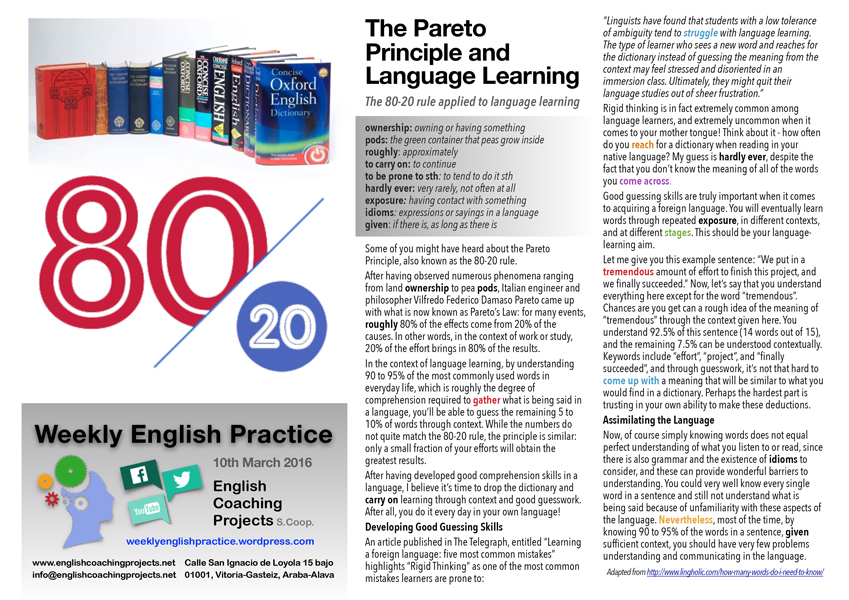Click on the image to download the pdf
The 80-20 rule applied to language learning
Vocabulary. Read and check you understand this before you read and listen to the article:
ownership: owning or having something
pods: the green container that peas grow inside
roughly: approximately
to carry on: to continue
to be prone to sth: to tend to do it sth
hardly ever: very rarely, not often at all
exposure: having contact with something
idioms: expressions or sayings in a language
given: if there is, as long as there is
Some of you might have heard about the Pareto Principle, also known as the 80-20 rule.
After having observed numerous phenomena ranging from land ownership to pea pods, Italian engineer and philosopher Vilfredo Federico Damaso Pareto came up with what is now known as Pareto’s Law: for many events, roughly 80% of the effects come from 20% of the causes. In other words, in the context of work or study, 20% of the effort brings in 80% of the results.
In the context of language learning, by understanding 90 to 95% of the most commonly used words in everyday life, which is roughly the degree of comprehension required to gather what is being said in a language, you’ll be able to guess the remaining 5 to 10% of words through context. While the numbers do not quite match the 80-20 rule, the principle is similar: only a small fraction of your efforts will obtain the greatest results.
After having developed good comprehension skills in a language, I believe it’s time to drop the dictionary and carry on learning through context and good guesswork. After all, you do it every day in your own language!
Developing Good Guessing Skills
An article published in The Telegraph, entitled “Learning a foreign language: five most common mistakes” highlights “Rigid Thinking” as one of the most common mistakes learners are prone to:
“Linguists have found that students with a low tolerance of ambiguity tend to struggle with language learning. The type of learner who sees a new word and reaches for the dictionary instead of guessing the meaning from the context may feel stressed and disoriented in an immersion class. Ultimately, they might quit their language studies out of sheer frustration.”
Rigid thinking is in fact extremely common among language learners, and extremely uncommon when it comes to your mother tongue! Think about it – how often do you reach for a dictionary when reading in your native language? My guess is hardly ever, despite the fact that you don’t know the meaning of all of the words you come across.
Good guessing skills are truly important when it comes to acquiring a foreign language. You will eventually learn words through repeated exposure, in different contexts, and at different stages. This should be your language-learning aim.
Let me give you this example sentence: “We put in a tremendous amount of effort to finish this project, and we finally succeeded.” Now, let’s say that you understand everything here except for the word “tremendous”. Chances are you get can a rough idea of the meaning of “tremendous” through the context given here. You understand 92.5% of this sentence (14 words out of 15), and the remaining 7.5% can be understood contextually. Keywords include “effort”, “project”, and “finally succeeded”, and through guesswork, it’s not that hard to come up with a meaning that will be similar to what you would find in a dictionary. Perhaps the hardest part is trusting in your own ability to make these deductions.
Assimilating the Language
Now, of course simply knowing words does not equal perfect understanding of what you listen to or read, since there is also grammar and the existence of idioms to consider, and these can provide wonderful barriers to understanding. You could very well know every single word in a sentence and still not understand what is being said because of unfamiliarity with these aspects of the language. Nevertheless, most of the time, by knowing 90 to 95% of the words in a sentence, given sufficient context, you should have very few problems understanding and communicating in the language.
“Let’s chat about that!
- How many words do you think you need to know to communicate in a language?
- How many words do you think you know in English?
- Do you think you are the type of learner “with a low tolerance of ambiguity”?
- How often do you reach for the dictionary when reading? Why?
- What other areas of life can the 80-20 principle be applied to?
- What methods do you have for learning new vocabulary… and using it?
Adapted from http://www.lingholic.com/how-many-words-do-i-need-to-know/


